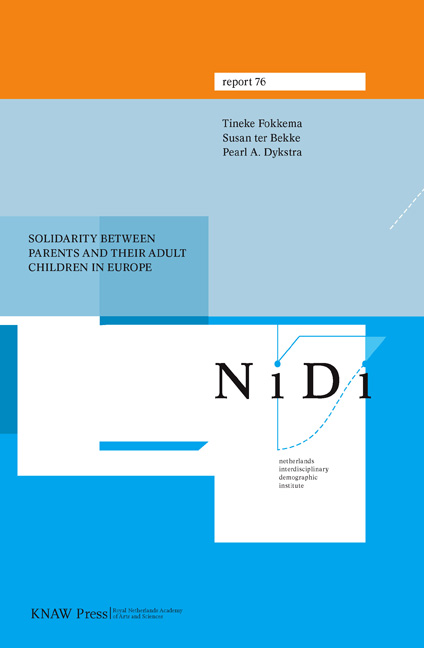Book contents
- Frontmatter
- Contents
- List of Figures
- List of Tables
- Executive Summary
- Acknowledgement
- 1 Introduction
- 2 Geographical Proximity
- 3 Contacts
- 4 Family Care Obligations
- 5 Support Exchange
- 6 Typology of Late-Life Families
- 7 Conclusion and Discussion
- References
- Appendix Measurement of the Independent Variables
- List of NIDI Reports
5 - Support Exchange
Published online by Cambridge University Press: 20 January 2021
- Frontmatter
- Contents
- List of Figures
- List of Tables
- Executive Summary
- Acknowledgement
- 1 Introduction
- 2 Geographical Proximity
- 3 Contacts
- 4 Family Care Obligations
- 5 Support Exchange
- 6 Typology of Late-Life Families
- 7 Conclusion and Discussion
- References
- Appendix Measurement of the Independent Variables
- List of NIDI Reports
Summary
Introduction
Support exchange is the last dimension of solidarity considered in this study. The literature pays particular attention to two issues. The first is the impact of the expansion of welfare state provisions, such as social security, pension, childcare arrangements and extramural and intramural eldercare services, on support exchange among family members. There is broad consensus that the expansion of the welfare state, together with social and cultural changes, have relieved the family of the primary and life-long responsibility of caring for its members in economic and practical terms (so-called de-familisation; Lister, 1994). There is less consensus, however, whether family support is being substituted by welfare state provisions or whether they are complementary, although empirical studies more often confirm the latter (Arber & Attias-Donfut, 2000; Chappell & Blandford, 1991; Daatland & Herlofson, 2001; Knijn et al., 2005; Rainwater et al., 1986). The second issue addressed in the literature concerns the main reasons why people provide support: do family members help each other because of ‘prescribed altruism’ and gendered norms and values (Finch, 1989; Land & Rose, 1985), or is reciprocity (norms and practices of giving and taking) the driving factor? And if reciprocity is what drives people to provide support, do family members reciprocate each other's support immediately or is some recompense expected in the long run (Gouldner, 1960; Komter et al., 2000)?
SHARE respondents were asked whether they had given support to, and whether they and their partner, if any, had received support from people outside their own household in the past 12 months, and if so, what kind of support this had been (personal care, practical household help and/or help with paperwork), to/by whom (answering categories of specific persons, including non-coresident children) and how often (almost daily, almost every week, almost every month or less often). They were also asked whether they or their partner had given or received 250 euros or more to/from people inside or outside their own household in the past 12 months, and if so, to/from whom (answer categories of specific persons, including children), why (list of specific reasons) and how much. Finally, respondents with one or more grandchildren were asked whether and if so, how often (almost daily, almost every week, almost every month or less often), they looked after them.
- Type
- Chapter
- Information
- Publisher: Amsterdam University PressPrint publication year: 2008



